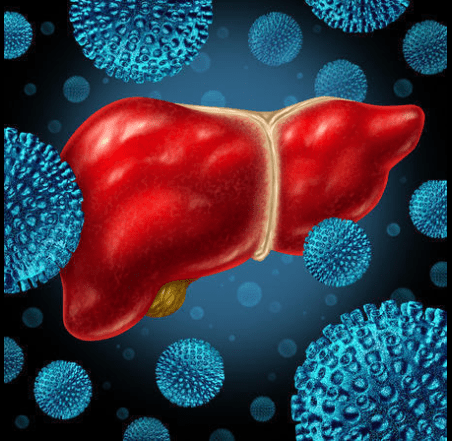Hepatitis A is an infection of the liver caused by hepatitis A virus (HAV). This virus is found in the blood or stool of infected individuals and it can be spread through contaminated water or food.
Furthermore, hepatitis A is a short-term type of hepatitis that requires no treatment. Most people recover from hepatitis A with immunizations and maintaining good hygiene.
Besides, hepatitis A has symptoms that last up to 2 months and they include nausea, stomach pain, fatigue, jaundice, dark urine, and loss of appetite. According to WHO, an estimated 7, 134 deaths occurred in 2016 as a result of hepatitis A worldwide.
The risk factors for hepatitis A infection are lack of safe water and poor hygiene. Luckily, there are safe vaccines that prevent hepatitis A.

Contents
Symptoms of Hepatitis A
The symptoms of hepatitis A rarely appear until you have it for a few weeks. However, not everyone with hepatitis A develops them. Older adults, teens, and children develop mild symptoms including:
- Abdominal pain and discomfort
- Light-colored stool
- Unexplained weight loss
- Dark urine
- Jaundice (yellowing of eyes and skin)
- Flu-like symptoms (fatigue, body aches, and fever)
- Sudden vomiting.
These symptoms appear within 15 to 6 days after you get the virus. Luckily, these symptoms are mild and they go away in a few weeks.
Causes of Hepatitis A
Hepatitis A is caused by a virus that causes inflammation of the liver cells. This inflammation affects how the liver functions and causes the symptoms of hepatitis A. The virus is transmitted when you take food or liquids contaminated with fecal matter containing the virus.
Other than contaminated water and food, the virus can be spread through close contact with an infected person. You should know that it doesn’t spread through coughing and sneezing.
An individual can contract hepatitis A virus by:
- Not practicing safe sex with a person with this virus
- Drinking contaminated water
- Eating food handled or prepared by someone with the virus – whose hygiene is poor
- Getting into contact with hepatitis A-infected fecal matter
- Eating raw shellfish from polluted water.
Who is at More Risk of Getting Hepatitis A Virus?
Hepatitis A is highly contagious because it is spread from one person to another. There are multiple factors that increase your risk of contracting it. These factors include:
- If you have a blood clotting disorder
- Travel to countries where hepatitis A is common
- If you are HIV positive
- Living in areas with low sanitation and lack of safe water
- Injecting or use of illegal drugs
- Living in the same household with someone with hepatitis A virus
- Gay sex
- Kids and teachers in childcare institutions.
How is Hepatitis A diagnosed?
After visiting your doctor, they will like to know more about your symptoms. Most people only have a few symptoms and no signs of jaundice (yellowing of skin and eyes). With no jaundice symptoms, diagnosing any form of hepatitis is hard through physical examination.
If your symptoms are minimal, hepatitis A remains undiagnosed and there will be no complications.
They can do a blood test to check for viral or bacterial infection. Blood tests easily reveal the absence or presence of hepatitis A virus.
Still, other tests can be done to check for antibodies that are made when exposed to hepatitis A and they can stay in the body for up to 6 months.
How is Hepatitis A Treated?
Up to now, there is no specific treatment for hepatitis A. because it is a short-term infection, most doctors concentrate on reducing the symptoms. After getting the virus, recovery can be slower taking several weeks or months.
When you have hepatitis A virus, it is essential to avoid unnecessary medications, such as paracetamol, acetaminophen, and medication against vomiting.
To help you ease the symptoms and recover fast, you should drink a lot of water, avoid alcohol consumption, and maintain a healthy diet.
How is Hepatitis A Prevented?
The best way to prevent hepatitis A is to get a hepatitis A vaccine. This vaccine involves a series of two injections, each 6 to 12 months apart.
In case you want to travel to a country or location where hepatitis A transmission is common, you should get your vaccine-like two weeks before. After the first injection, the body takes two weeks to start building immunity to hepatitis A.
Below are important tips that can help limit your risk of contracting hepatitis A virus:
- Make it a habit of eating at established restaurants or clean areas
- In developing countries or those with high hepatitis A contraction rate, always drink bottled water
- Wash your hands thoroughly before eating, drinking, and after using washrooms
- Don’t eat raw fruits and vegetables in areas with poor hygiene and sanitation
- Have protected and healthy sex every time.